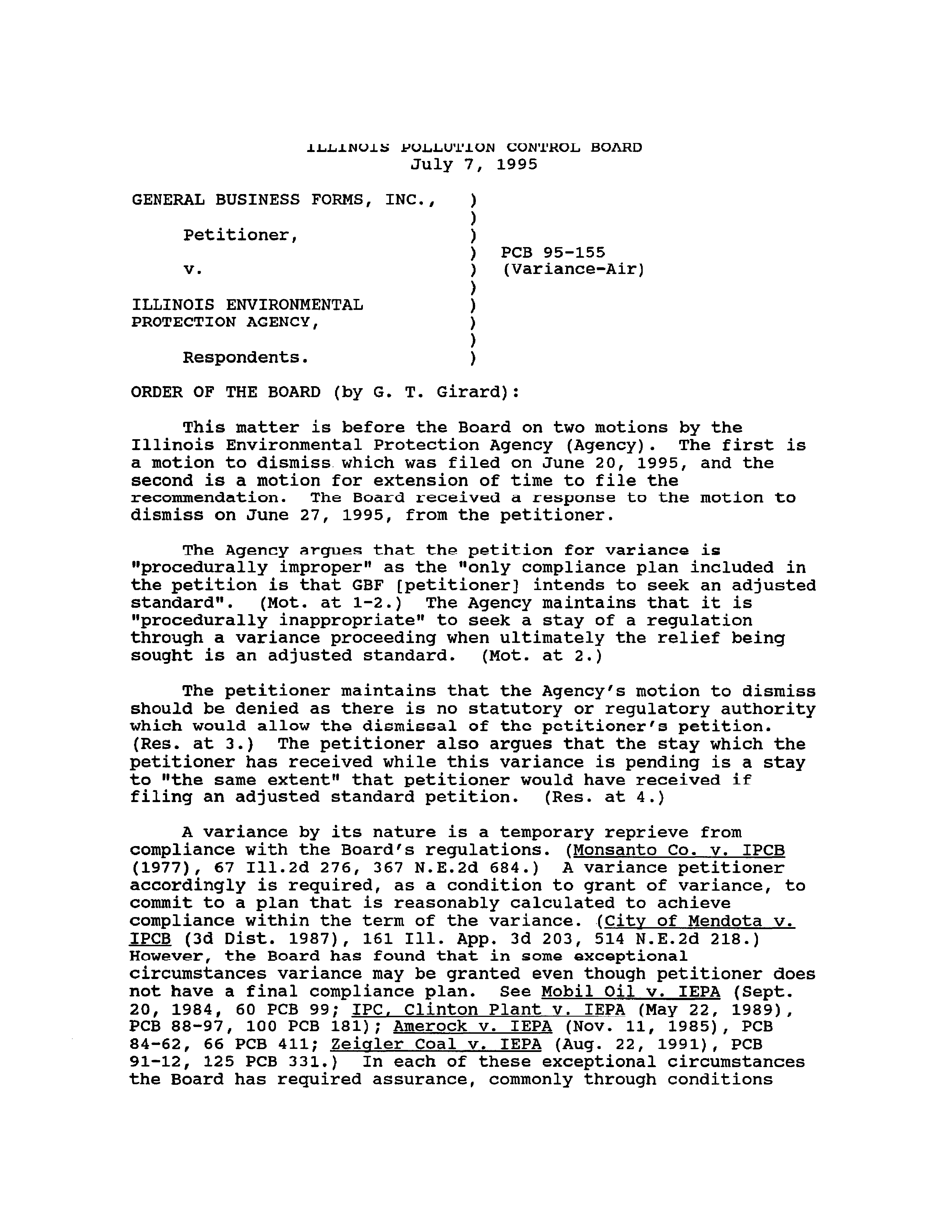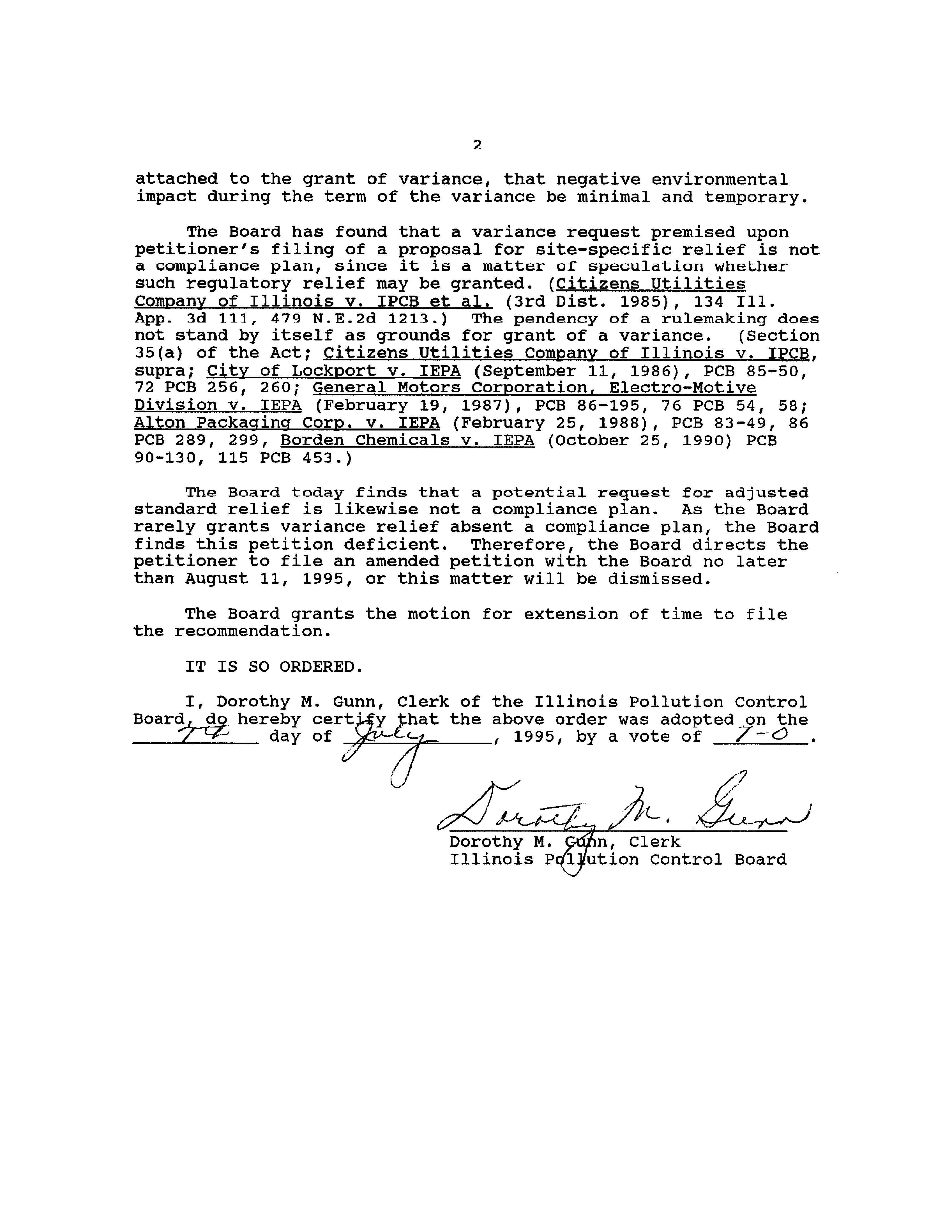ILLINOIS
POLLUTION
CONTROL
BOARD
July 7,
1995
GENERAL BUSINESS FORMS,
INC.,
)
)
Petitioner,
)
PCB 95—155
v.
)
(Variance-Air)
)
ILLINOIS ENVIRONMENTAL
)
PROTECTION AGENCY,
)
)
Respondents.
ORDER OF THE BOARD
(by G.
T. Girard):
This matter is before the Board on two motions by the
Illinois Environmental Protection Agency
(Agency).
The first is
a motion to dismiss. which was filed on June 20,
1995,
and the
second is a motion for extension of time to file the
recoimnendation.
The Board received a response to the motion to
dismiss on June 27,
1995,
from the petitioner.
The Agency argues that the petition for variance is
“procedurally improper” as the “only compliance plan included in
the petition is that GBF (petitioner)
intends to seek an adjusted
standard”.
(Not. at
1-2.)
The Agency maintains that it is
“procedurally inappropriate” to seek a stay of a regulation
through a variance proceeding when ultimately the relief being
sought is an adjusted standard.
(Not. at
2.)
The petitioner maintains that the Agency’s motion to dismiss
should be denied as there is no statutory or regulatory authority
which would allow the dismissal of the petitioner’s petition.
(Res.
at 3.)
The petitioner also argues that the stay which the
petitioner
has
received while this variance is pending is a stay
to “the same extent” that petitioner would have received if
filing an adjusted standard petition.
(Res. at 4.)
A variance by its nature is a temporary reprieve from
compliance with the Board’s regulations.
(Monsanto Co.
v. IPCB
(1977),
67 Ill.2d 276,
367 N.E.2d 684.)
A variance petitioner
accordingly is required,
as a condition to grant of variance,
to
commit to a plan that is reasonably calculated to achieve
compliance within the term of the variance.
(City of Mendota v.
IPCB
(3d Dist.
1987), 161 Ill. App.
3d 203,
514 N.E.2d 218.)
However, the Board has found that in some exceptional
circumstances variance may be granted even though petitioner does
not have a final compliance plan.
See Mobil Oil v. IEPA (Sept.
20, 1984,
60 PCB 99; IPC, Clinton Plant v.
IEPA
(May 22,
1989),
PCB 88—97,
100 PCB 181); Amerock
v.
IEPA
(Nov.
11,
1985),
PCB
84—62,
66 PCB 411;
Zeigler Coal v.
IEPA
(Aug.
22,
1991),
PCB
91—12,
125 PCB 331.)
In each of these exceptional circumstances
the Board has required assurance,
commonly through conditions
2
attached to the grant of variance, that negative environmental
impact during the term of the variance be minimal and temporary.
The Board has found that a variance request premised upon
petitioner’s filing of a proposal for site-specific relief is not
a compliance plan,
since it is a matter of speculation whether
such regulatory relief may be granted.
(Citizens Utilities
Company of Illinois v. IPCB et al.
(3rd Dist.
1985),
134 Ill.
App.
3d
111,
479 NE2d
1213.)
The pendency of a rulemaking does
not stand by itself as grounds for grant of a variance.
(Section
35(a)
of the Act;
Citizefls Utilities company_~fIllinois v.
IPCB,
supra; City of Lock~ortv.
IEPA (September 11, 1986), PCB 85—50,
72 PCB 256,
260; General Motors Corporation, Electro-Notive
Division v. IEPA (February
19,
1987), PCB 86—195,
76 PCB 54,
58;
Altori Packaainct Corn.
V.
IEPA (February 25,
1988), PCB 83-49,
86
PCB 289,
299, Borden Chemicals v.
IEPA (October 25,
1990)
PCB
90—130,
115 PCB 453.)
The
Board today finds that
a potential request for adjusted
standard relief is likewise not a compliance plan.
As the Board
rarely grants variance relief absent a compliance plan, the Board
finds this petition deficient.
Therefore, the Board directs the
petitioner to file an amended petition with the Board no
later
than August 11,
1995,
or this matter will be dismissed.
The Board grants the motion for extension of time to file
the recommendation.
IT IS SO ORDERED.
I, Dorothy N. Gunn,
Clerk of the Illinois Pollution Control
Board
do hereby cert)4y that
the above order was adoptedpn the
-‘
day of
____________,
1995,
by a vote of
—
~
AL,
Dorothy
M.
9d~n,
Clerk
Illinois P~’~)ution
Control Board


